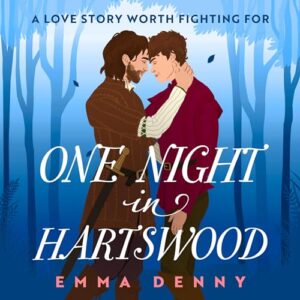
Narrated by Tom Alexander & Sebastian Humphreys
There aren’t all that many medieval romances published these days, and certainly not many queer ones, so I was intrigued when I saw the blurb for Emma Denny’s One Night in Hartswood, which promised a story of mistaken identities and a road trip romance between two unlikely lovers set in England in 1360.
When the story opens, Lord Griffin Barden (who goes by Raff) and his retinue are on the final leg of their journey from Dunlyn on the Scottish border, to Oxfordshire, where he and his older brother, Ash, will see their sister, Lily, married to William, the son and heir of Marcus de Foucart. Rumour has it that the Earl – only recently ennobled by the King – is a hard, harsh man, but nothing is really known about his son; Raff can only hope his temperament is different to his father’s for Lily’s sake.
Following an argument with his brother later that day, Raff storms off into nearby Hartswood Forest, needing to be alone with his thoughts (and so he doesn’t do something he’ll regret.) As he walks deeper into the forest, the tangy metallic scent of blood hits him just before he sees its origin – a doe caught in a snare. He’s pondering what to do – he doesn’t want to prolong the animal’s agony, but killing a deer is a crime that carries a severe punishment – when a man emerges from the trees, a man who, by his dress, is clearly not a poacher, but not a nobleman either. The two of them work to release the animal from the snare and Raff appraises the newcomer – taller than Raff but slender, with dark eyes and a mop of dishevelled brown curls, his clothing indicating he’s likely a member of de Foucart’s household staff. Once they’ve put the deer out of its misery the other man offers his name. Penn.
From Penn, Raff learns a little more about the Earl and about the man his sister is to wed, relieved to hear that William is not like his father. They walk a little and talk a little, and an attraction starts to bloom culminating in a passionate kiss that ends all too quickly when they’re interrupted by the sound of people coming closer – and Raff tells Penn to run.
Next morning, Raff is rudely awakened by a boot in the back from his brother, together with the news that William de Foucart has vanished. After the search parties sent out return sans William, the Earl reluctantly asks Raff – who is a skilled tracker – if he will go out to search for him. In the meantime, Ash and Lily are to return to the Barden lands in the north, while their father remains in Oxfordshire.
Raff and Penn eventually meet again as Raff is making his way through Hartswood Forest, and when Penn asks if Raff will take him with him, wherever he’s going, Raff suggests that perhaps they will be able to find Penn a new home and position somewhere along the way back to his home in the north. The extra time on the journey will afford Raff a bit of breathing space where he can just be himself, free of all the responsibilities he’d taken on when Ash went to war, but has shown no signs of wanting to relieve him of since his return.
Listeners already know that Penn is, in fact, William de Foucart, and that he has not only fled an unwanted marriage but also the father who regards him as a waste of space and treats him accordingly. He doesn’t know Raff from Adam, so not clueing him in as to his identity makes sense initially – and Raff doesn’t disabuse Penn of his belief that he’s also a servant, a huntsman and tracker, so the deception is mutual. The days spent on the road give plenty of time for their slow-burn romance to take root, for talking and getting to know each other – and for cuddling together for warmth night after night under the stars. Not a great deal happens during this part of the story, other than Raff and Penn working out where to take shelter each night and Raff teaching Penn how to fight to defend himself, but the characters, their bubbling chemistry and the excellent narration kept me engaged, as did the arrival of Ash, who spends a few days with Raff and Penn on the road, and immediately sees how things are between them. After Ash departs and Raff and Penn are alone again, they both realise that their time on the road together is coming to an end, so they try to find excuses to prolong it for as long as they can, neither of them wanting to break the bubble of happiness they’ve found in each other. But they – and we – know their idyll can’t last much longer.
Despite Penn seeming a bit TSTL to start with – I mean, he goes out into the forest in winter without a coat or cloak! – I liked him and I liked Raff. Penn is kind and good-natured, but has been raised to believe he’s worthless and has little self-esteem, where Raff is much more self-confident, but is struggling under the weight of expectation and guilt at wanting to live his own life. I liked them as a couple, too – they complement each other and share a commonality of outlook and the same dry sense of humour.
The author creates a reasonably believable HEA for Raff and Penn, but the biggest problem I had with the story overall is its total lack of historical feel. I assume that the war Ash fought in must have been the Hundred Years War, but there are few markers to identify this story as set in the fourteenth century. (There’s no mention of the Black Death, which had killed a third of the population of Europe by 1350). And I kept asking myself – why did the author decide to have Raff and Penn travelling through England in the dead of winter when they have to sleep in fields or on the side of the road most of the time? How did they manage to find enough to eat during this journey of several weeks? We’re told Raff is hunting and snaring game – but there would be no abundance of that in winter. It would have made more sense to have set the story in the warmer months of the year. (Spring night are often cold enough to have warranted the open-air cuddling!)
There’s an interview with the author at the end of the audiobook in which she talks about how she’d initially thought about writing One Night in Hartswood as an ‘alt-historical’ or ‘fantasy historical’, but had then decided to write it as an historical romance – I think she should have stuck with the alt/fantasy idea.
The narrators – Tom Alexander (Raff) and Sebastian Humphreys (Penn) – are new-to-me, but both do an excellent job and added considerably to my overall enjoyment of the listen. They convey a real sense of the emotional closeness developing between Raff and Penn and their voices are pleasant and easy on the ear; Mr. Alexander’s is slightly lower in pitch and he injects just the right amount of gruffness into Raff’s dialogue and has a good stab at the ‘hybrid’ northern/Scottish accent Raff is described as having. The slightly higher pitch and even timbre of Mr. Humphreys’ voice work well to portray Penn as somewhat quieter and less confident than Raff – and both narrators are really good when it comes to reading the dialogue of the ‘other’ lead, so that Raff in Penn’s sections sounds as close to the Raff of Raff’s sections as possible, given a different person is speaking. Both are able to consistently employ a variety of accents – Scottish for Ash, and a kind of all-purpose “Northern” for their father – and their female voices are good, too.
Despite my criticisms, I did enjoy listening to One Night in Hartswood and would cautiously recommend it to anyone interested in a ‘medieval-lite’ road trip romance filled with sparring-as-foreplay, cuddling-for-warmth and mutual pining. The narration by Tom Alexander and Sebastian Humphreys is a definite plus and puts it in the ‘win’ column overall.
Caz
Buy One Night in Hartswood by Emma Denny on Amazon




I wonder if the author decided not to invent a setting because it would be more work. If she did a fake world (not quite fantasy to me if you don’t include anything fantastical) she’d have to do the worldbuilding, and the same with alt-history, I guess. Anywho, I’ll probably pick this up given the strong narration.
It’s definitely worth listening to if you’re in the mood for an “historical-lite” – I just couldn’t help asking myself little niggling questions – like nobody knew anyone who had been affected by the Black Death; how come Griff’s family accept his sexuality so easily (okay, so his siblings are the leads in the other books in the series, so they’re queer too, but his father doesn’t seem bothered either!)